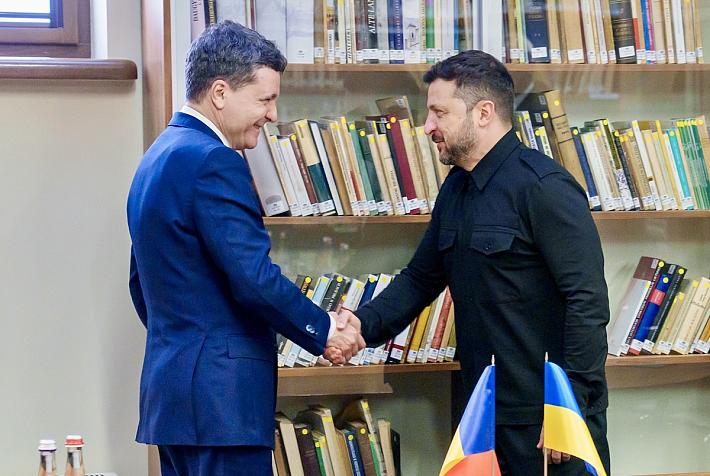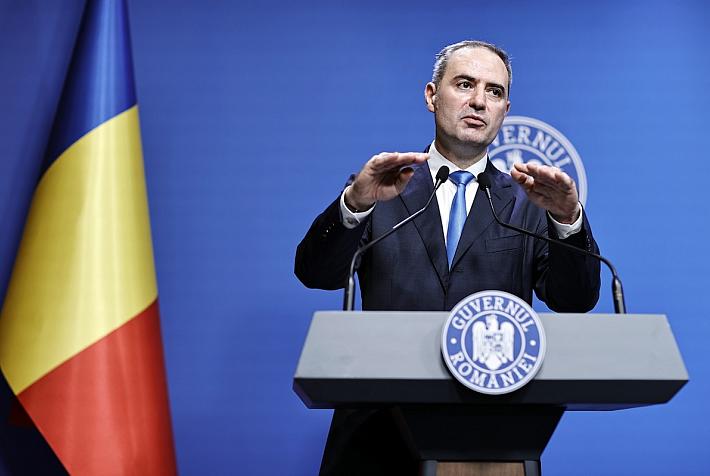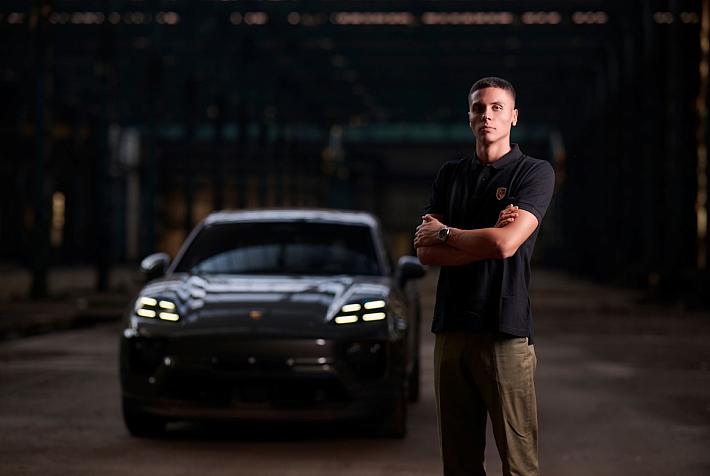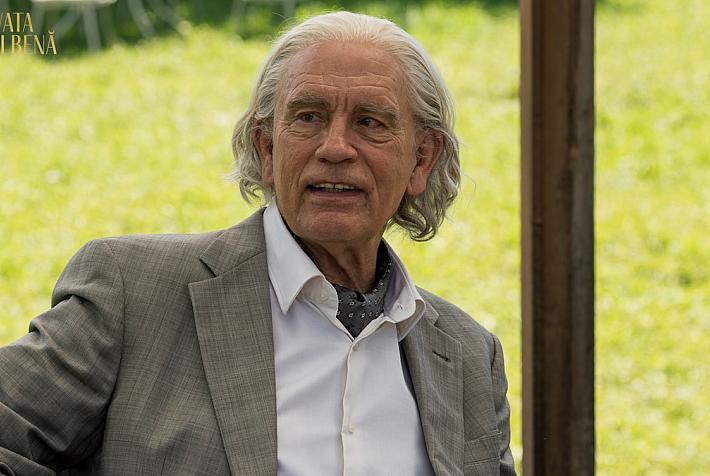Two young Americans chase their Romanian dream
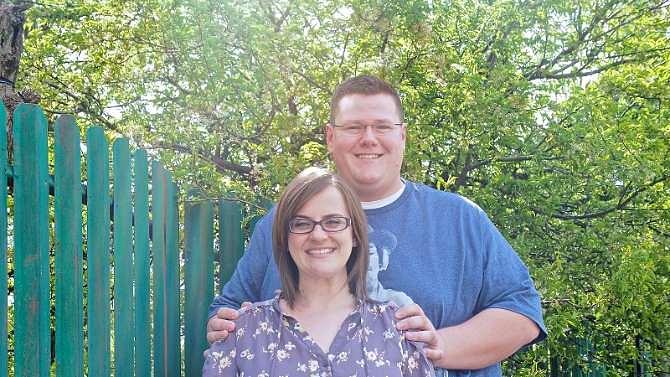
An American couple sells everything, including their Christmas decorations, and moves to Romania. They set up a human trafficking prevention NGO and want to stay here for as long as Romania will want them.
Ryan Crozier has a big picture of a tree right in front of his desk. It’s not a photo he has taken, nothing special; just something bought from Ikea. But he likes trees, and it is something to look at. He moved to this office in May last year, together with his team from Eliberare, the NGO and social business Ryan founded in Romania.
Maybe the tree picture provided Ryan some comfort. He wasn’t sure if it was the best idea to come to this area, some kilometers away from the center of Bucharest. But the house, located near a disused railway track, somewhere between Militari and Drumul Taberei neighborhoods, soon proved a good idea for Eliberare.
The first floor provides enough space for the team that works directly for the NGO, but also for the designers, who fuel the business that helps fund the nonprofit activity. Ryan has his own office: with the tree picture, a small candle on the table, a board with a picture of him and his wife Andrea. There’s also a paper with a message written by a kid in Romanian, “Ryan, te iubesc mult mult mult mult” (Ryan, I love you very very very much).
As for the ground floor, they just started organizing the place. They brought a table tennis board, set up a cafe-looking corner. They want to go beyond the NGO’s initial scope. Eliberare is mainly focused on preventing human trafficking, but Ryan and Andrea understood that the best prevention is to intervene in the community and help vulnerable groups. So they will use the ground floor to organize various activities for the kids and teenagers in the area.
Ryan, who is 30, has a child-like glance and looks happy in his office. His blue eyes shine when he speaks about Romania and his life here. You can’t feel any trace of regret for the USA, the place where he was born, grew up, went to college, got married. His mom and friends are still there, but he doesn’t have any plan to go back. Nor does Andrea, his wife, who is also from the United States. Unlike many expatriates, who see their staying in Romania as transitional, they know they will stay here for many, many years.
Ryan is a great storyteller. While it rains heavily, I take sips of hot coffee and listen to Ryan’s story like I’d watch a movie.
Everything begins with a long plane ride
Long time ago, on a Sunday afternoon, on the way to lunch, Ryan was in the back seat of the car. His dad asked him: ‘Hey, do you have any interest in going on this trip to Romania?’ “My first question was - how long is the plane ride? I was 12.”
They came with a group from their church, stayed for ten days and worked with street kids. It changed Ryan’s dad. He was working in law enforcement and doing social work, but in that trip to Romania he saw an opportunity to help and do good. Ryan was just a kid, so the emotional impact on him was different. But he does remember the hundreds of homeless kids near the Gara de Nord railway station. The whole family kept coming back in the next years. Ryan’s father even thought about moving here for good, but his wife wasn’t at peace with the idea.
15 years later, Ryan did move to Romania. It wasn’t only his dad’s dream that he made come true. It had become his own dream in the meantime.
I meet Ryan and Andrea right after the Easter weekend. They are delighted about how empty Bucharest gets during a holiday. They found themselves asking ‘where is everybody?’, as they were driving through Bucharest; the city where they have lived for three years, founded the NGO and gave birth to a baby boy.
Ryan was talking about Romania a lot when they met in college, says Andrea. “The equivalent of guys, at least in the States, for whom everything is about sports. For Ryan, it was Romania.” As they started dating and things got more serious, Andrea realized that Ryan was very convinced about moving to Romania. She needed to make sure that it was the same for her. “If I’m just ‘sure, whatever sounds fine to you’, after a while it may get frustrating.” Andrea was used to changing places and starting anew. While growing up, she moved to different cities, as her dad got a new job. It wasn’t always easy, but she enjoyed meeting new people. Eventually, she was also hooked on the Romanian dream.
The unusual Valentine’s day
Andrea and Ryan’s story starts on a Valentine’s day back in college, but not on a regular date. They bumped into each other in the university campus’ common laundry area. None of them had a date for Valentine’s, so they started talking. When Andrea’s friends stopped over and invited her to a restaurant, she said she did not want to leave her laundry in the dryer. Ryan seized the opportunity: “I can fold it for you and put it in the basket.”
Ryan steps in: “When my mom heard the story, she was like, ‘You know how to fold laundry?’ I was never doing mine.”
When she returned from the restaurant, Andrea found the laundry folded. And it was more than that. Under a few layers of clothes, there was a spoon; and under a few more layers, there was a yoghurt, and in a few more there were Oreos. “Oh, this is kind of cute, he put little treats,” Andrea thought.
They felt like they could talk to each other about anything. Andrea remembers one of their early conversations in a common area of their dorms. “ I think I saw then more of his, not to be cheesy, but more of his heart for people and I thought, this is so great!” Even today when they take long car rides or they go on trips, these are their best conversations. “We could talk and talk and talk and dream about this and that.”
The cliff
Ryan remembers a metaphor he heard during college, which impressed him a lot. A person was sitting near a cliff, catching people who are about to fall. That’s how he sees human trafficking prevention.
Human trafficking is still a tabu topic in the Romanian society. People think it may be happening in Moldova, or Russia or Ukraine and sound surprised when they hear what a common issue this is in Romania, too. A message on Eliberare’s Facebook page shines some light: “Did you know that 94% of the human trafficking victims have been approached directly by recruiters?”
One of the most effective ways to prevent human trafficking is community building, Andrea says. Isolated, lonely people are much more vulnerable, whereas a community offers a support system.
Small steps
Even though Eliberare is not a religious non-profit organization, Ryan thinks that local churches have a potential for social change, and they are well-equipped to help the members of the community.
“We want to see more of that, and not just churches, but people helping and serving others, communities. People are hungry to be part of something; they want to know others and be known.”
To finance the NGO’s activities, Ryan has thought of a model that can be sustainable over time. Eliberare has a team of designers who work for various projects in Romania and the US. The NGO uses the money it makes from design to fund the NGO’s activities, from spreading information about human trafficking through booklets and stickers or online, to organizing seminars in high schools. They also support other nonprofits which deal with human trafficking, either by helping them with design or promotion.
Ryan and Andrea also want to engage more in community-building programs in the Militari neighborhood. They organize a photography class for ten kids in the area, and want to develop a summer program with various activities for children and teenagers. “It’s not gonna change Militari, but for those kids, it’s going to make an impact in their lives.”
By Diana Mesesan, features writer, diana@romania-insider.com
(photo by Diana Mesesan)






